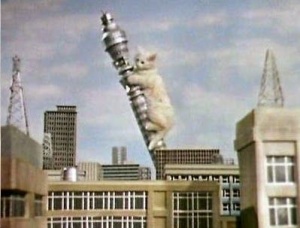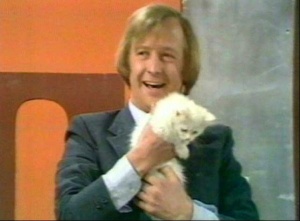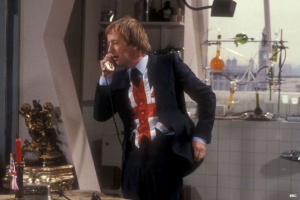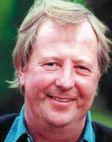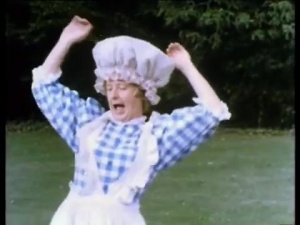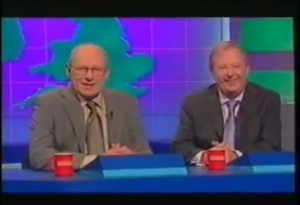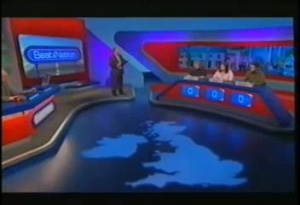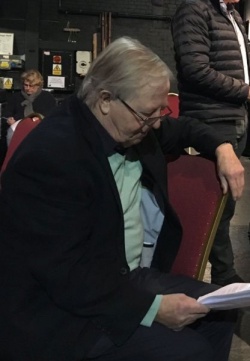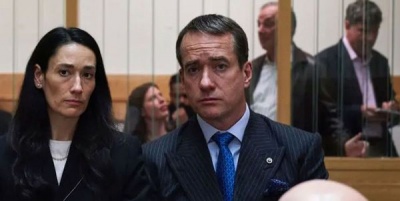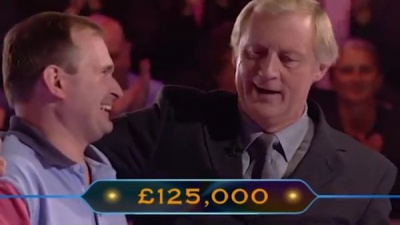Weaver's Week 2020-04-19
Last week | Weaver's Week Index | Next week
"A life dedicated to making people laugh is the best-lived life of all."
They're flying the kitten at half mast from the Post Office Tower this week, in memory of a comedy legend.
Tim Brooke-Taylor
Timothy Julian Brooke-Taylor was born in Buxton in 1940, and was sent to the fee-paying school at Winchester, where his housemasters saw how he always wanted to be the star of a theatre entertainment. Then he went to Pembroke college at Cambridge University, ostensibly to read law but really to join the Footlights comedy theatre crew. He was in the Cambridge Circus tour of 1963 alongside such other comedy geniuses as John Cleese and Graeme Chapman and Humphrey Barclay.
Tim moved to radio in 1964, with a radio version of Cambridge Circus. Now called I'm Sorry I'll Read That Again, the show became an early comedy cult. Young people are listening to ISIRTA! Young people are listening to The Home Service!! Most of the listeners to the Home Service are dead, or even older!!! The gang split in 1973, John Cleese went off to do some television work, David Hatch Of The BBC became a respected radio producer, and later manager.
On the television, Tim joined ATV for On the Braden Beat, then to The Frost Report and At Last the 1948 Show. He returned to the Beeb for It's Marty with Marty Feldman, and Broaden your Mind with Graeme Garden.
Tim's best remembered work was one-third of The Goodies, a precise satire on... well, we're not sure, actually. He'd worked with Graeme Garden on ISIRTA and The Braden Beat, and had met Bill Oddie at Cambridge. The Goodies had the basic format of a situation comedy, of three people trying to make the world a better place. To do this, they'd take part in some very surreal sketches and put themselves in bizarre situations. For instance, the time when London is terrorised by a giant kitten. For instance, the venomous Bagpipe spider that stalks Loch Ness. For instance, the lost martial art of ecky-thump. And there were parodies of television commercials of the time, and other ephemera.
Tim's character was an over-patriotic man with aristocratic leanings. He wore a three-piece suit with a Union Jack waistcoat, would hum the national anthem, and drank more tea than is humanly possible. It's a send-up of his real personality, the double-barrelled name and softly-spoken RP accent. It's a character that could have been Tim, but wasn't: he sometimes described it as "an unpleasant right-wing coward". The other Goodies were also warped extensions of their personalities: Dr Graeme Garden as the slightly over-ambitious scientist, and Bill Oddie as the short man who pootles about with great persistence and little industry.
The Beeb never quite knew whether The Goodies was a late-night programme, for adults at 10pm. Or if it was for children, on account of being entirely farce and devoid of moral message. Or if it was merely comedy genius, the right thing to put on as a light diversion opposite the main evening news. The Goodies moved to independent television for the final series, they had been messed about by the BBC and followed the money to LWT. Rarely repeated over here, The Goodies was a regular fixture on ABC in Australia.
Not just a Goodie
At the same time as The Goodies, Tim was involved in Radio 4's "antidote to panel games", I'm Sorry I Haven't a Clue. A surreal show, under the uncertain hand of Humphrey Lyttelton, Tim worked with fellow Goodie Graeme Garden, with scriptwriter and wit Barry Cryer, and with cartoonist Willie Rushton.
The show was a semi-improvised panel contest: the talent know what rounds are coming up, but not what the specifics are going to be. The aim isn't to be funnier than the next man, but to keep the comedy flying around. Tim would often be the butt of jokes, especially in the music rounds where he was encouraged to sing falsetto and to contemporary tunes like "Teenage dirtbag". ISIHAC proves that the points are far less important than the contribution, that people make great comedy when the score is kept quietly.
Tim did other radio work: with Barry Cryer and John Junkin on pun-tastic sketch comedy Hello Cheeky (Radio 2, 1973-9), and its unsuccessful television version for YTV.
He was the only one of the Goodies to find further mainstream comedy success. Sure, Bill has his nature documentaries, Graeme used his medical knowledge and wrote comedy, Tim performed comedy. His and Hers saw Tim and Madeline Smith play the neighbours of a couple where the wife was a city accountant and the husband took care of the home; it was eclipsed by The Good Life. Me and My Girl saw Tim as the third wheel again: business partner to Richard O'Sullivan, who was bringing up his teenage daughter. The Rough With the Smooth pitched Tim with John Junkin as two bachelors who shared a flat. And You Must Be the Husband, where screen wife Diane Keen wrote a salacious novel and got very famous very quickly. More recently, he voiced Animal Antics for BBC1.
There were films, too: The Chase with Cliff Richard, where the two picked up a suitcase of stolen money and were pursued across Scandinavia. Tim had a cameo in Charlie and the Chocolate Factory, where his supercomputer knew exactly where the three remaining Golden Tickets were hidden. In 1979 he followed Frank Muir as rector of the University of St Andrews.
In addition to the long-running ISIHAC, Tim spent seven series hosting the Radio 4 entertainment Hoax!. Three celebrity guests joined Tim and told some long and intricate anecdotes. Two of the tales were true, and one was a lie. The objective of the panel was to question each other about whose tall tale was true, and which was not. They'd question each other, and Tim would join in – he hadn't been tipped off about which tale was fabricated, so played along with the rest of the panel. The concept came to television as Would I Lie to You?.
On the telly, Tim hosted the one-week wonder Qd - The Master Game, a drama contained in an immersive quiz, stripped every night for a week. He came back to Channel 4 in 2004 to host Beat the Nation, again with Graeme Garden. The show is almost forgotten, though in retrospect it's become more important as a forerunner to Pointless.
Each question had been put to over 1000 people before the show, and the value of the question was the percentage of people who got the question wrong. High scores were the way to go on this show, where buzzers were also used. (Ever realised they never use buzzers on Pointless? Us neither.) Tim read out the value of the right answer, and gave some additional facts where they were merited, so this makes him the Original Source of the Richardosman. Other elements of Beat the Nation would remain on Channel 4: a particular typeface for the numbers, and a full score from Augustin Bousfield, were both elements on the following year's Deal or No Deal.
Beat the Nation was an amiable enough show, perhaps a bit rough around the edges, but nothing desperately wrong with it. Nor was there anything desperately right with it, and the show suffered from being the one that replaced Fifteen-to-One in its timeslot. After the initial commission (of over 100 episodes) ended, Beat the Nation has faded into obscurity, not even sold to the Challenge channel.
Tim continued to work right up into this year: he was on the ISIHAC tour in January, and recorded some radio editions in Harrogate in February. Tim is survived by his wife Christine, and their sons Ben and Edward.
In other news...
A new face is to join ITV's The Chase. Darragh Ennis was named as the sixth Chaser, following his own strong appearance on the show some time ago.
Like so many other shows, The Chase is in re-runs at the moment – so too is Tipping Point, and after being shunted across to BBC2 for the past month, Pointless is also back to repeats. Countdown will continue with the current series for two more weeks, then we understand they'll repeat the Thirtieth Birthday Championship from early 2013.
This week's big new show was Quiz, a drama on ITV. It's based on "Bad Show", the book of the trial of Charles and Diana Ingram. While the script took a few liberties with the truth, melding characters together and omitting marginal facts, it certainly had the ring of truthiness about it. We particularly enjoyed the opening episode, where the people at Celador try to pitch this show to ITV, and suddenly find they've got a monster hit on their hands.
Has it changed the popular opinion of Charles and Diana Ingram? Quite possibly: the sense seems to have shifted from "he's been convicted, he's guilty" to "there's no way they should have let that tape be used as key evidence". The Ingrams have put in an appeal against their conviction, and we'll update if there's any news to report.
We also note that all editions of Martin Bashir's documentary A Major Fraud have been disappeared from a popular video sharing site. In its place, current copyright holders Sony have put up a "real footage" version of Charles Ingram's time in the chair, edited to enhance the coughs they want us to hear, and to add captions telling the prosecution's story. Quiz was far more balanced, but that's required of broadcast television.
A quick word on Mend It for Money (Chalkboard Television for Channel 4, Monday). On this show, people bring items they want to sell to a restorers' workshop, and let someone buff it up – for a share of the eventual sale price. There's a small competitive element, the seller is able to choose between two potential repair workers, based on their experience and price. The bulk of the show follows the repair process, and the eventual result. Tom Allen gives a waspish voiceover. It was a decent pilot programme, of particular appeal if you're into BBC1's The Repair Shop and Find It Fix It Flog It, but there's not enough competition for us to deem it a game show.
Joe Lycett gets everywhere these days. The comedian's fabric-based contest The Great Sewing Bee advances to BBC1 (Wed). It's also the University Challenge final (BBC2, Mon). The St George's Day edition of Pointless Celebrities on Saturday, with the unlikely combination of Gyles Brandreth and Baga Chipz. Last in the present series of Catchpoint, and In for a Penny visits York.
Photo credits: BBC, Initial Midlands, Left Bank Pictures, Celador.

